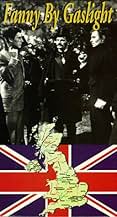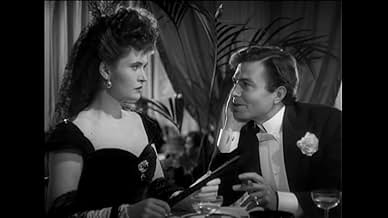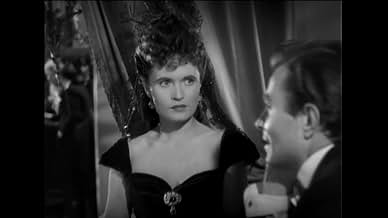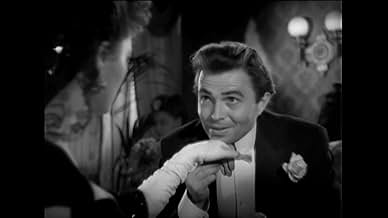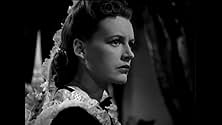Fanny's father dies in a fight. Her family runs a brothel. Her real father is a politician. She falls for his advisor Harry. Lord Manderstoke's interference causes conflicts between classes.... Read allFanny's father dies in a fight. Her family runs a brothel. Her real father is a politician. She falls for his advisor Harry. Lord Manderstoke's interference causes conflicts between classes. Tragic events occur due to the Lord's schemes.Fanny's father dies in a fight. Her family runs a brothel. Her real father is a politician. She falls for his advisor Harry. Lord Manderstoke's interference causes conflicts between classes. Tragic events occur due to the Lord's schemes.
- Director
- Writers
- Stars
- Maid
- (uncredited)
- Director
- Writers
- All cast & crew
- Production, box office & more at IMDbPro
Featured reviews
Ironically, the viewers who air such views suffer from the very thing they accuse the movie of: being stuck in their own era. Perfect example, the reviewer who called this movie "stilted and rather tame." If you watch it on its terms, it is neither. Another began the review, "This is a story that doesn't age well," then proceeded to praise the presentation of the protagonist: "With every revelation, she has to make a choice about whether to live her life honestly or prudently." That is a timeless theme.
"Fanny by Gaslight" is admirable as cinema as well: finely paced and structured by director Anthony Asquith; beautifully shot by Arthur Crabtree (a Hitchcock protégée); and with sensitive portrayals by all the actors, even minor roles.
Of course it is Phyllis Calvert as Fanny who dominates the film, ably supported by a well-chosen supporting cast. I much regret that my favorite contemporary British director, Ken Russell, was never able to realize his last major project -a new version of "Moll Flanders", but seeing this 1944 costume picture some 80 years after courtesy of YouTube makes up for it thanks to a very fine British print.
My original intention was to see James Mason and Stewart Granger face off against each other. Instead, I found myself falling in love with the heroine played by Phyllis Calvert, who immediately became my favorite British actress.
The story may smack of soap opera; I've followed several in my time, and yet this story, admittedly overdone, I found to be very sympathetic, and immediately found myself falling in with the main protagonist, and wishing her to eventually prevail, despite all the adversity she had to face from so many individuals.
I have continued to love this movie and have gone back to seeing it many times. I admit that Stewart Granger is rather wooden at times and James Mason appears only at certain strategic moments. However, the player whom I found myself yearning more to see was Jean Kent; fortunately for her, she was given full opportunity to display her complete diversity in subsequent films, many of which I have also seen. (I would like to comment that Ms. Kent is happily still with us, approaching 90 as of next year.)
I agree that the moment where Stuart Lindsell as Fanny's natural father is about to kill himself because of pressures exerted by his erstwhile wife having become too much is right out of a horror story, at the moment where one sees those multiple mirror images.
Certain other players in this film I have also found to be quite believable considering the context - Wilfrid Lawson as Chunks, Amy Veness as Mrs. Heaviside, and perhaps one or two others.
In addition to James Mason, the individual contributions by Margaretta Scott and Cathleen Nesbitt are also sufficiently believable to invite our intense dislike, as each throwing another obstacle in the path of our heroine.
I understand that these impressions are purely individual; as with any work of art, we experience such in our own way. In my case, it made a very warm, positive impression on me - I cannot say exactly why. I would recommend it to anyone who likes high Victorian melodrama, mindful that I am not necessarily in a majority with my impression, but that is how I am. Chacun e son gout, as they say.
I just finished viewing Madonna of the Seven Moons, another film in this same Gainsborough series, and also featuring Phyllis Calvert, Jean Kent,and Stewart Granger. While this latter is a fascinating story based upon a multiple personality, I found it to be inferior in its cohesiveness and ability to draw the viewer in, compared with Fanny by Gaslight, which I have just commented on. I could easily imagine that the superior direction by Anthony Asquith may have something to do with it.
This film is a lovely story...very much like an old fashioned love story. This is NOT meant as an insult...such stories can be very satisfying if well written and the characters enjoyable...which they definitely are here.
In many ways, FANNY comes straight out of Victorian melodrama. The hypocrisy of Victorian England as essayed in Dickens and Conan Doyle is rife here: the delicate pattern of respectability is shown to be infinitely fragile. This is why the accumulation of Fanny's traumas is so plausible - one toppling domino of the edifice of respectability leads to a complete and far-reaching collapse.
The result is a failure of patriarchy, an oppression split against itself. Look at the frightening scene where Fanny's 'real' father is shown in splintered mirror reflection - the pressure turns him, Jekyll-and-Hyde-like, from a feckless, passive fraud, into a figure from a horror film, as he foresees his own death, the only option to his self-created web of deceit (wow, you really do get into it!). Fanny's first family home stands over her supposed father's burlesque house, home to many of the Victorian great and good. The fact that she has two fathers emphasises this pervasive dichotomy.
Women, in this double world, have only two options open to them, and they have a rotten deal in both. If they try to live with integrity and decency, like Fanny, they are buffeted, nay fairly walloped by a most malevolent Fate (or the workings of a corrupt social machination, whatever you want to call it). Fanny's swoonings are less conventional Victoriana than blows dealt by forces beyond her.
If, on the other hand, women transgress, like Lucy, or her father's wife (both, appropriately, if cheerfully xenophobically, linked to Frenchness), they are equally vulnerable to caprice, as their lovers turn against them, or abandon them. The film is also very good on how the idea of 'woman' is constructed in patriarchal society - there are many elaborate scenes of dressing and undressing, distortions of 'natural' femininity. Class construction is analysed too, also limiting and defeating men.
The title of the film might seem oblique, or merely atmospheric, until we note all the gaslamps standing suggestively between characters; part of a wider phallic plot, seen most interestingly, less obviously, between Stewart Granger and James Mason. Mason is perversely the most sympathetic character in the film. I say perversely, because, for the first hour and a half, he is a real monster, a glorious, diabolical, handsome, unredeemably vicious, incredibly sexy monster, who clearly has the filthiest, and most elaborate, Sadean sex ever. He is the ultimate transgressor, taboo in both the Underworld and respectable society, the two being complicit in the same corrupting system. He is only on screen in annoyingly , if appropriately brief, spurts - the first fifteen minutes of the film is electrifying entertainment. He is an aristocrat, locus of all the fears, yet desires (and 1940s British women worshipped him) of the British middle classes.
But when he goes to France - as all four protagonists do: it is a site of freedom from the ubiquitous repression of Britain, but also the ultimate venue of closure where everything is fatally brought to a head - he becomes a much more understandable, tragic figure. We see he has been demonised by respectable society as a demonic Id that must be cast out. His reduction from malevolent swaggerer to simian depressive is a shock to behold. His forcing of the duel is less a matter of honour than a poignant wishing for death. Mason is outstanding, turning a potential caricature into a figure of far greater depth. He is the Fassbinder hero of this melodrama, the tormented transgressor; not the two protagonists, whose desire for conventionality will only replicate the system that tortured them in the first place.
What is finally remarkable about the film is how these issues managed to get aired at the height of World War II. Gainsborough films were by far the most popular among British audiences at a time when duty, austerity, self-denial was mandatory. These films, and especially FANNY, by contrast, became the focus of all those repressed desires - a dissatiafaciton with authority and patriarchy; the thrill of (particularly female) transgression; the impulse to excess; a rejection of duty and tradition; all the things in real life audience members were supposed to be defending. Is it any surprise Labour got in the following year? That is why the films, beyond their stereotypical melodrama, remain enduringly fascinating. Just more James Mason, please...mmm.
Did you know
- TriviaThe film was originally banned in the USA because it transgressed the Hays Purity Code.
- Quotes
Clive Seymour: Fanny. I don't know how to begin to tell you this. I promised your mother. William Hopwood was not your father.
- Crazy creditsOpening credits prologue: LONDON
1870
- ConnectionsFeatured in The Ultimate Film (2004)
- How long is Man of Evil?Powered by Alexa
Details
- Runtime
- 1h 30m(90 min)
- Color
- Aspect ratio
- 1.33 : 1

